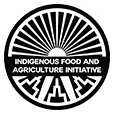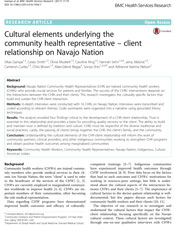
CULTURAL ELEMENTS UNDERLYING THE COMMUNITY HEALTH REPRESENTATIVE – CLIENT RELATIONSHIP ON NAVAJO NATION
Background: Navajo Nation Community Health Representatives (CHR) are trained community health workers (CHWs) who provide crucial services for patients and families. The success of the CHRs’ interventions depends on the interactions between the CHRs and their clients. This research investigates the culturally specific factors that build and sustain the CHR-client interaction.
Methods: In-depth interviews were conducted with 16 CHRs on Navajo Nation. Interviews were transcribed and coded according to relevant themes. Code summaries were organized into a narrative using grounded theory techniques.
Results: The analysis revealed four findings critical to the development of a CHR-client relationship. Trust is essential to this relationship and provides a basis for providing quality services to the client. The ability to build and maintain trust is defined by tradition and culture. CHRs must be respectful of the diverse traditional and social practices. Lastly, the passing of clients brings together the CHR, the client’s family, and the community.
Conclusion: Understanding the cultural elements of the CHR-client relationship will inform the work of community partners, clinical providers, and other indigenous communities working to strengthen CHR programs and obtain positive health outcomes among marginalized communities.
Gampa et al.
Year: 2017
BMC Health Services Research
https://docs.wixstatic.com/ugd/0dcff4_e4f44afca6184fa0912fa09e14f0f2f9.pdf
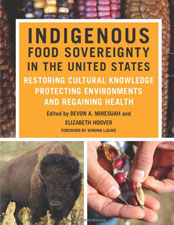
INDIGENOUS FOOD SOVEREIGNTY IN THE UNITED STATES: RESTORING CULTURAL KNOWLEDGE, PROTECTING ENVIRONMENTS, AND REGAINING HEALTH
Unprecedented in its focus and scope, this collection addresses nearly every aspect of indigenous food sovereignty, from revitalizing ancestral gardens and traditional ways of hunting, gathering, and seed saving to the difficult realities of racism, treaty abrogation, tribal sociopolitical factionalism, and the entrenched beliefs that processed foods are superior to traditional tribal fare. The contributors include scholar-activists in the fields of ethnobotany, history, anthropology, nutrition, insect ecology, biology, marine environmentalism, and federal Indian law, as well as indigenous seed savers and keepers, cooks, farmers, spearfishers, and community activists. After identifying the challenges involved in revitalizing and maintaining traditional food systems, these writers offer advice and encouragement to those concerned about tribal health, environmental destruction, loss of species habitat, and governmental food control.
Devon A. Mihesuah, Elizabeth Hoover, Winona LaDuk
2019
University of Oklahoma Press
https://www.amazon.com/Indigenous-Food-Sovereignty-United-States/dp/0806163216
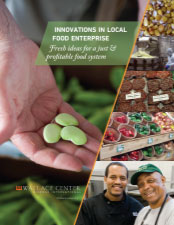
INNOVATIONS IN LOCAL FOOD ENTERPRISE: FRESH IDEAS FOR A JUST AND PROFITABLE FOOD SYSTEM
Innovations in Local Food Enterprise: Fresh Ideas for a Just and Profitable Food System addresses one of the most complex issues facing food access and regional food system development allies today: how can consumer price and producer cost meet in ways that transition healthy, local food from a privilege to a right? Innovations in Local Food Enterprise analyses and aggregates a collection of innovative solutions to overcoming difficult food access and food equity issues with a focus on market-based consumer-driven solutions for low-income underserved communities.
The report is based on learning from our Healthy Urban Food Enterprise Development (HUFED) Center and from the work of others who are creating and implementing market-based and non-market-based food access solutions in a very hands-on, practical way. Our hope is that this report will inform, inspire, and prepare readers to innovate in their own communities and for those in decision making roles, to have this knowledge in mind as they envision and develop programs.
Wallace Center at Winrock International
Year: 2013
https://www.wallacecenter.org/resourcelibrary/hufedinnovationsreport
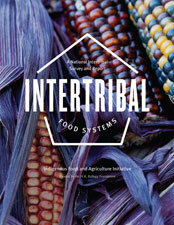
INTERTRIBAL FOOD SYSTEMS: A NATIONAL INTERTRIBAL SURVEY AND REPORT
For far too long, tribal communities have been disconnected from their lands and resources. This has separated many from their traditional foods, putting tribal culture and health in peril. The result has been an increase in chronic illness, such as obesity, diabetes and heart disease. Food scan was completed on behalf of the W. K. Kellogg Foundation, which has a long standing commitment to improving health equity and supporting food systems change. This scan is only a snapshot of the good work happening in tribal communities across the country, and could never be complete. Every day things are changing, people are building upon what we know and bettering their local food systems.
Indigenous Food and Agriculture initiative at the University of Arkansas School of Law and the funder, the W.K. Kellogg Foundation.
Year: 2015
http://communityfood.wkkf.org/pix/WKKF_food-scan_IFAI_r304.pdf
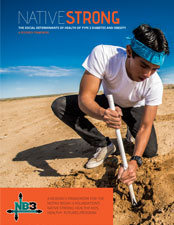
NATIVE STRONG: THE SOCIAL DETERMINANTS OF HEALTH OF TYPE 2 DIABETES AND OBESITY, A RESEARCH FRAMEWORK
This research project aims to better understand these issues by examining the social determinants of health of childhood obesity and type 2 diabetes among Native American people from a Native/Indigenous perspective.
Using this perspective, this paper considers the unique indigenous factors (i.e. historical trauma, self determination, cultural activities, etc.) in better understanding the role and impact of the social determinants of health among Native people. The goal of this research project is to: 1) provide a research framework to guide the NB3 Foundation’s approach to addressing childhood obesity in Native communities, 2) begin to analyze the current infrastructure for collecting available public data and 3) investigate the gaps and issues with data collection, access and dissemination.
Notah Begay III Foundation
2015
http://www.nb3foundation.org/assets/docs/2015-10-20-SDOH%20Full%20Summary%20FINAL.pdf
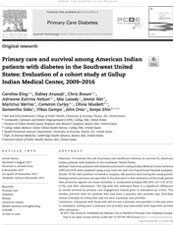
PRIMARY CARE AND SURVIVAL AMONG AMERICAN INDIAN PATIENTS WITH DIABETES IN THE SOUTHWEST UNITED STATES: EVALUATION OF A COHORT STUDY AT GALLUP INDIAN MEDICAL CENTER, 2009–2016
Objectives: To evaluate the role of primary care healthcare delivery on survival for American Indian patients with diabetes in the southwest United States.
Methods: Data from patients with diabetes admitted to Gallup Indian Medical Center between 2009 and 2016 were analyzed using a log-rank test and Cox Proportional Hazards analyses.
Results: Of the 2661 patients included in analysis, 286 patients died during the study period. Having visited a primary care provider in the year prior to first admission of the study period was protective against all-cause mortality in unadjusted analysis (HR (95% CI) = 0.47 (0.31, 0.73)), and after adjustment. The log-rank test indicated there is a significant difference in overall survival by primary care engagement history prior to admission (p < 0.001). The median survival time for patients who had seen a primary care provider was 2322 days versus 2158 days for those who had not seen a primary care provider.
Conclusions: Compared with those who did not see a primary care provider in the year prior to admission, having seen a primary care provider was associated with improved survival after admission King et al.
2017
Elsevier Ltd. on behalf of Primary Care Diabetes Europe
https://docs.wixstatic.com/ugd/0dcff4_666c70d67c944e24b6810104459b8bb5.pdf
RECLAIMING INDIGENOUS FOOD RELATIONSHIPS: IMPROVING HEALTH WITH CULTURE
Reclaiming Indigenous Food Relationships was created and organized for Native American organizations, tribal communities and individuals. By exploring the traditional teachings that connect all parts of life to food and health, it is designed to support Indigenous people in achieving their best health. The framework is based on the traditional medicine wheel with food at the center, surrounded by the stages of life, the changing seasons and the various aspects of individual and community health.
American Indian Cancer Foundation and University of Minnesota
2018
https://www.americanindiancancer.org/wp-content/uploads/2017/12/RIFR-9.7.18-PRINT-1.pdf
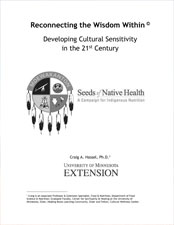
RECONNECTING THE WISDOM WITHIN: DEVELOPING CULTURAL SENSITIVITY IN THE 21ST CENTURY
The Seeds of Native Health Campaign has chosen a deliberate strategy of reaching out to the agriculture, food, nutrition and public health disciplines to join in the work of solving the dietary health crisis in Indian Country. Healthful measures of deliberation and care are needed. Deliberation is needed because while significant cultural differences between Western/Eurocentric and Indigenous conceptions of the world have always existed, most academic disciplines have not developed strategies or methodologies that might effectively interface and bridge these cultural differences. Care is needed because these intercultural dynamics are further complicated by a difficult history of colonization. A major problem here is that most of us as academic professionals were trained to see and represent our disciplines as holding universal truths. We seldom recognize the truths and knowledge held by Indigenous Peoples. We seldom, if ever, represent our disciplines or position our expertise as cultural constructions. Unlike many academic approaches, my own experience in community and crosscultural engagement represents the starting point for my scholarship and teaching, as well as for this publication. Consistent with my own experience, agriculture, food, nutrition and public health disciplines still lack strategies, methodologies and pedagogies to develop capacity for engaging, interfacing and bridging Indigenous Peoples systems of thought. Openness to what Indigenous Peoples might have to offer is still largely missing from professional training.
Craig A. Hassel
2018
University of Minnesota Extension
https://seedsofnativehealth.org/wp-content/uploads/2019/03/Reconnecting-the-Wisdom-Within-web.pdf
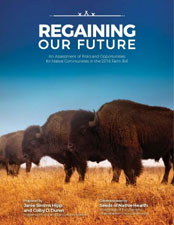
REGAINING OUR FUTURE: AN ASSESSMENT OF RISKS AND OPPORTUNITIES FOR NATIVE COMMUNITIES IN THE 2018 FARM BILL
“Much like the 2014 Farm Bill, which was projected to spend $956 billion over a 10-year period, the 2018 Farm Bill will be one of the largest non-defense funding authorizations to be considered in the history of this country. Since the Intertribal Agriculture Council’s inception, we have struggled to rally the support of tribes to effectively advocate for greater Native inclusion in previous Farm Bills. This document will serve as a new foundation for our ongoing efforts, working in partnership with the Indigenous Food and Agriculture Initiative, the SMSC’s Seeds of Native Health campaign, the National Congress of American Indians, and the Intertribal Timber Council to ensure well-crafted, effective, and thoughtful agriculture and nutrition policy; and a soapbox from which tribal voices can be heard in creating of that policy.” – Ross Racine, Executive Director Intertribal Agriculture Council
Prepared by Janie Simms Hipp and Colby D. Duren: Indigenous Food and Agriculture Initiative;.. Commissioned by Seeds of Native Health – A campaign of the Shakopee Mdewakanton Sioux Community
Year: 2017
https://seedsofnativehealth.org/regaining-our-future-report/
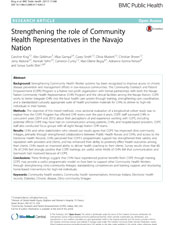
STRENGTHENING THE ROLE OF COMMUNITY HEALTH REPRESENTATIVES IN THE NAVAJO NATION
These findings suggest that CHRs have experienced positive benefits from COPE through training. COPE may provide a useful programmatic model on how best to support other Community Health Workers through strengthening clinic-community linkages, standardizing competencies and training support, and structuring home-based interventions for high-risk individuals King et al.
2017
BMC Health Services Research
https://docs.wixstatic.com/ugd/0dcff4_296d4ed14d0647bb815223f0b41751a8.pdf
THE SIOUX CHEF’S INDIGENOUS KITCHEN
Sean Sherman with Beth Dooley
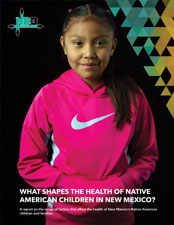
WHAT SHAPES THE HEALTH OF NATIVE AMERICAN CHILDREN IN NEW MEXICO: A REPORT ON THE RANGE OF FACTORS THAT AFFECT THE HEALTH OF NEW MEXICO’S NATIVE AMERICAN CHILDREN AND FAMILIES.
After introducing key health factors, this report highlights relevant research on the health of Native American children in New Mexico. The overall purpose of the report is just not to raise awareness. It is intended to help guide discussions and support policy developments that improve future wellbeing of the Native American children of New Mexico. It concludes with a look at indigenous indicators and future opportunities.
Notah Begay III Foundation
http://www.nb3foundation.org/wordpress/wp-content/uploads/2017/12/NB3_NM_FactSheet_v121217WEB.pdf
Research and Data
AMERICAN INDIAN COLLEGE FUND
Publishes articles, research journals
AMERICAN INDIAN CULTURE AND RESEARCH JOURNAL
UCLA, American Indian Studies Center in Los Angeles, CA
Phone: 310-206-7508 | Email: [email protected]
The American Indian Culture and Research Journal, the premiere journal in Native American studies, publishes book reviews, literature, and original scholarly papers on a wide range of issues in the fields of history, anthropology, geography, sociology, political science, health, literature, law, education, and the arts.
AMERICAN INDIAN HIGHER EDUCATION CONSORTIUM
The center provides access to a broad spectrum of on-going AIHEC activities, intercommunity information resources and data repositories. Many sections of the Center are open to the public. Other sections are restricted to specific groups of participants engaged in cooperative AIHEC projects.
Location: Alexandria, VA
COLLABORATIVE RESEARCH CENTER FOR AMERICAN INDIAN HEALTH (CRCAIH)
The Collaborative Research Center for American Indian Health (CRCAIH-pronounced “KIRK-uh”) was formed in September 2012 with a grant from the National Institute for Minority Health and Health Disparities. MISSION: The Collaborative Research Center for American Indian Health (CRCAIH) is designed to create a platform to bring together Tribal communities and health researchers from multiple disciplines, to work together in conducting cutting-edge transdisciplinary research that addresses significant health disparities experienced by American Indians in South Dakota, North Dakota, and Minnesota. Our goal is to build tribal research infrastructure and promote transdisciplinary research teams to improve American Indian health through examination of social and environmental influences on health.
COMMUNITY OUTREACH & PATIENT EMPOWERMENT PROGRAM
COPE strives to promote healthy, prosperous, and empowered Native communities through three collaborative approaches: Robust, community-based outreach; Local capacity building and system-level partnerships; and Increasing access to healthy foods.
Navajo Fruit & Vegetable Prescription (FVRx) Map, Authors: Thomas Scharmen, New Mexico Department of Health; Carrie House, Northwest New Mexico Council of Governments; Burrell Jones, COPE Program
Gallup, NM
FIRST NATIONS DEVELOPMENT INSTITUTE
The Food Sovereignty Assessment Tool (FSAT) assists Native communities in reclaiming their local food systems. It helps demystify the process of data collection about local food systems and provides tools and a framework for Native communities to measure and assess food access, land use and food policy in their communities.
Knowledge Center
Native Food Systems Resource Center: The Native Food Systems Resource Center is an initiative of First Nations Development Institute, under our Native Agriculture and Food Systems Initiative. We also undertake research projects that build the knowledge and understanding of Native agriculture and food-systems issues, and inform Native communities about innovative ideas and best practices. We also participate in policy forums that help develop legislative and regulatory initiatives within this sector. We plan to continue to expand and improve this website so it becomes an ever-more valuable resource to Native American food producers and processors, consumers – including individual families – and to larger Native tribes, organizations and communities.
PUBLICATIONS: Nourishing Native Foods & Health
Longmont, CO and Albuquerque, NM
https://www.firstnations.org/publications/food-sovereignty-assessment-tool-2nd-edition/
https://www.firstnations.org/knowledge-center/
http://www.nativefoodsystems.org/about
https://www.firstnations.org/knowledge-center/publications/nourishing-native-foods-health/
HONOR THE EARTH
The focus of our Food Security granting program is to support Native-led efforts in food sovereignty through both re granting, and by leveraging intellectual support through resources, trainings, speaking, and consultations with grassroots organizations and tribal governments in the drafting of tribal food policy.
INDIGENOUS FOOD AND AGRICULTURE INITIATIVE
The Indigenous Food and Agriculture Initiative encompasses multi-disciplinary research, service, and education opportunities.
Fayetteville, AR
Whitney Sawney, [email protected]
JOHN HOPKINS, BLOOMBERG SCHOOL OF HEALTH
Programming in multiple locations, Univeristy based in Baltimore, MD
Phone: (410) 955-6931
Center for American Indian Health: We work in partnership with tribal communities to design public health programs that raise the health status, self-sufficiency, and health leadership of Native people to the highest possible level. We are an independent center within the Department of International Health of the Johns Hopkins Bloomberg School of Public Health with offices in Arizona and New Mexico as well as a Great Lakes Hub in Duluth, Minnesota. With over 35 years of collaboration with Native American tribes, our programs now reach more than 120 tribal communities in 17 states. These partnerships have achieved landmark public health breakthroughs credited with saving over 60 million children’s lives worldwide.
NATIVE FOOD SYSTEMS RESOURCE CENTER
Longmont, Colorada and Fredericksburg, Virginia
NATIVE SEEDS SEARCH
Seed bank, Native Seeds/SEARCH (NS/S) is a nonprofit seed conservation organization based in Tucson, Arizona. Our mission is to conserve and promote the arid-adapted crop diversity of the Southwest in support of sustainable farming and food security.
NATIVE WELLNESS INSTITUTE
Gresham, OR
Jillene Joseph , Executive Director , 503-666-7669, [email protected]
Native Wellness Institute was founded in 2000 by a knowledgeable and dedicated group of Native individuals, including tribal leaders, committed to making a positive difference in Indian country.
We are a 501 (C) 3 non-profit organization serving as the leading provider of Native-specific and wellness-related training and technical assistance (strategic planning, program design and curriculum development) to Native people, communities, tribes and organizations throughout North America.
From bringing together the most highly-skilled Native trainers and consultants to share their knowledge and wisdom at large national conferences, to offering smaller regional workshops in Native communities that improve physical, spiritual, emotional and mental well-being, the Native Wellness Institute (NWI) is bringing about positive changes like no other organization of its kind in Indian country.
NORTH DAKOTA STATE UNIVERSITY
Fargo, ND
Associate Professor Donna Grandbois, (701) 231-9793, [email protected]
NDSU offers the only Master of Public Health program in the nation specifically designed to prepare graduates to work with American Indian populations and to improve Native health.
NORTHWEST INDIAN COLLEGE, TRADITIONAL PLANTS AND FOODS PROGRAM
The NWIC Cooperative Extension Office offers a wide variety of community education programs, workshops, train the trainers, conferences, and events throughout the Pacific Northwest. To date, our Extension programs have been hosted by 26 of Washington’s 29 tribes. Our mission is to promote self-sufficiency and wellness for indigenous people through culturally grounded, multi-generational, and holistic programs.
Lummi Nation, WA
TRIBAL COLLEGE JOURNAL OF AMERICAN INDIAN HIGHER EDUCATION
UNIVERSITY OF ARKANSAS SCHOOL OF LAW
UNIVERSITY OF MINNESOTA, COLLEGE OF FOOD, AGRICULTURAL AND NATURAL RESOURCE SCIENCES - CFANS
Healthy Foods, Healthy Lives Institute: The mission of the HFHL Institute is to increase and sustain the University’s impact in the interdisciplinary arena of food, agriculture and health by building the University’s capacity in research, learning and community engagement. The priority areas for focus are food safety, prevention of obesity and chronic disease, food policy and food security. Within these priority areas, of special importance is the integration of agriculture and medicine. Hosts Annual Native American Nutrition Conference.
USDA NATIONAL INSTITUTE OF FOOD & AGRICULTURE
The 1994 Land-Grants receive four main types of grants. Tribal College Equity supports formal education at these schools. Tribal College Extension supports informal, community-based learning such as farmer education, youth development and rural entrepreneurship. Tribal College Research helps the 1994 Land-Grants build scientific capacity and provide a strong foundation in research knowledge for students. The Federally Recognized Tribes Extension Program (FRTEP) allows 1890 and 1862 Land-Grants to provide informal learning to support youth development and agricultural productivity. They complement the Extension efforts of the 1994 Land-Grants, often serving in states that do not have a 1994 Land-Grant.
https://nifa.usda.gov/resource/tribal-program-data-and-outcomes
WALLACE CENTER
The Wallace Center develops partnerships, pilots new ideas, and advances solutions to strengthen communities through resilient farming and food systems.
Arlington, Virginia
WELL FOR CULTURE
WELL FOR CULTURE is is a grassroots initiative which aims to reclaim and revitalize Indigenous health and wellness. We study and implement the lifestyle teachings of our ancestors, meanwhile incorporating new information to contribute to this ancient and ongoing chain of knowledge. Indigenous culture has always been dynamic, and wellness is an inherent aspect. Well For Culture promotes holistically well lifestyles. We believe in mind-body-spirit optimization through theseven circles of wellness. Much like a ceremony, a song, a story, or an activist movement, Well For Culture is at once a space, a place, a group of people, and an evolving idea.
W.K. KELLOGG FOUNDATION WIKI
Map of community food projects



